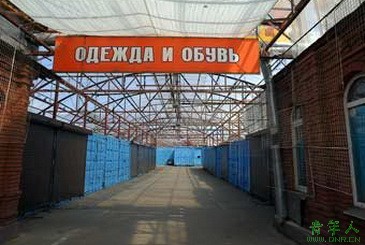
Chinese merchants have called for a tough stance against Russia following the closure of Moscow’s biggest market that forced 60,000 Chinese traders out of business, as China’s vice minister of commerce departs for Moscow today with a special delegation as part of efforts to tackle the issue.
The Chinese delegation traveling to Moscow includes officials from the Ministry of Commerce (MOFCOM), the Ministry of Foreign Affairs, the State Administration of Taxation and trade officials from Zhejiang and Fujian provinces.
Cherkizovsky Market is the biggest wholesale market in Moscow, and a large number of its traders are from China, Vietnam and Central Asia. It was shut down temporarily on June 29 by the city government.
A senior industry leader yesterday expressed strong opposition toward the Russian government using “gangster logic” to justify its closure of Cherkizovsky Market.
“It is Russia’s gangster logic that led to the closure of the market,” Xie Rongfang, general secretary of the Wenzhou Shoe Industry Association, said.
Merchants from Zhejiang Province were the worst hit by the market closure, and hundreds of shoe makers in the region are likely to go bankrupt.
“Russians need to sit down and think what will happen to the Russian people if all Chi-nese-made goods are denied entry into its market,” Xie said, adding that Russians would be bereft of good quality and cheap clothes and food.
The Russian government’s decided last month to destroy $2 billion worth of smuggled goods from China. Closing Cherkizovsky Market sparked panic and despair among tens of thousands of Chinese merchants, at least 150 of whom were arrested in the closure.
Customs corruption
The Russian government claimed that its decision was designed to crack down on customs corruption and smuggled Chinese-made goods, which enter Russia through the practice of so-called gray customs clearance.
An official with the Russia-China General Chamber of Commerce, who requested anonymity, told the Global Times, “Russian customs officials and around 100 Chinese merchants held a meeting over the closure of Cherkizovsky Market, but no results have been announced.”
Dong Qinfen, a staff member of Shenzhen Neptune Logistics, told the Global Times that fewer and fewer Chinese companies have been doing business in Russia since the Russian government clamped down on the so-called gray customs clearance last month.
Safeguarding interests
Xie Rongfang suggested that the Chinese government take tough measures, or the situation will not change and the interests of Chinese businesspeople will not be fully protected.
“We have noticed that domestic Internet users are greatly concerned by the plight of Chinese traders in Russia,” Chen Rongkai, deputy director of the press office of MOFCOM, told the Global Times.
“A first stand will be taken to safeguard the interests of Chinese businessmen in Russia,” Xie said, without elaborating.
“Gray customs clearance’’ began in the early 1990s amid social confusion arising from the downfall of the Soviet Union. Faced with a shortage of commodities, the Customs Committee of Russia, in an effort to encourage import trade and simplify customs procedures, allowed its customs clearance companies to provide one-stop services that covered both transportation and customs-clearance procedures.
To protect the interests of the Wenzhou traders, Xie’s association has initiated a new trade channel to Russia involving four major Wenzhou manufacturers and with a 10 million yuan ($1.5 million) investment. The trade platform is dubbed “white customs clearance.”
As many as 49 containers of goods have been successfully imported into the Russian market since the launch of the new channel, officials said.
Excuses, excuses
But Xie said that Russia is using every excuse to deny the entry of Chinese goods. “Our containers were once seized on the excuse of hygiene problems, even though the products are exported through the white customs clearance.”
“We have no option but to export our products through gray customs clearance, as the white clearance is a lengthy process and forces Wenzhou merchants to wait,” Xie said. “We have to sell shoes at exactly the right time.”
According to Xie, the white customs clearance cost Chinese manufacturers more before 2005, but now the two procedures cost almost the same.
As many as 8,000 containers of goods will be affected, Xie said, without giving specific figures of economic losses.
But Wang Le’an, a member of the Wenzhou Chamber of Commerce, told the China Business newspaper, the economic losses for Wenzhou merchants will exceed $800 million, and the losses of Zhejiang’s merchants will surpass $1.5 billion.
An Baijie contributed to this story
责任编辑:刘小蜗
